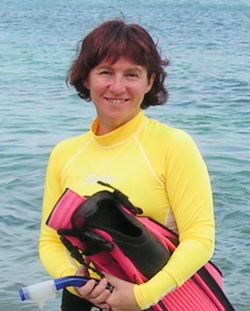
A Woman of Action
 There is a great interview of Dr. Deborah Bronson in E Magazine’s newsletter. The marine scientist talks about working with Sri Lankan fishermen to get them to stop dynamiting the reefs (an incredibly destructive, if efficent method of fishing), and the reef devastation wrought by Hurricanes, which are made worse by humanity’s trappings (and already exacerbated by global warming).
There is a great interview of Dr. Deborah Bronson in E Magazine’s newsletter. The marine scientist talks about working with Sri Lankan fishermen to get them to stop dynamiting the reefs (an incredibly destructive, if efficent method of fishing), and the reef devastation wrought by Hurricanes, which are made worse by humanity’s trappings (and already exacerbated by global warming).
A couple excerpts:
E Magazine: Through your work you’ve spent considerable time working in the aftermath of the Asian tsunami disaster, which resulted in catastrophic loss of human life and property. But what Americans rarely hear about is the damage that was also done to marine life. Can you give us a sense of what was lost?
Deborah Brosnan: The underwater devastation was patchy. If you saw the images of the wave coming in, you could see how it destroyed stuff and then pulled it out with it. Well, all that stuff pretty much landed on coral reefs. In one area 92 to 325 million cubic feet of debris ended up on reefs and the sea floor. I saw everything from refrigerators to furniture to an entire house on reefs, and that stuff rolls around and smashes the coral up into bits. Corals grow about a quarter of an inch a year, so reefs are anywhere from 100 to about 1,000 years old, with the really pretty ones being older.
It’s pretty clear now that reefs protect coasts, as do mangroves and sand dunes—just look at what happened on the U.S. Gulf Coast, for example. Do you think people are getting the message about the importance of wise coastal development?
I don’t think everybody is getting the message, I really don’t, and that is distressing to say the least. People especially aren’t getting the message in the developing world, where they are most vulnerable. Many people on the ground are responding in ways that are not sustainable because they’ve got no choice.
I have been to the Gulf Coast since Katrina, where a lot of the issues are the same as I saw in Southeast Asia. The devastation isn’t as huge, but it’s very serious in some areas and people are responding in the same ways. I think it’s clear that some of our activities, such as putting channels through the mangroves, made the disaster worse because we created funnels for the storm surge.
How hopeful are you that we will still have reefs in 200 years?
I am worried about what is happening to reefs because I have seen many of the changes, yet I’ve also seen what a difference people can make when they decide that they are going to take care of their environment. I helped set up a marine reserve 10 years ago in the Caribbean, at St. Bart’s. At first, there were hardly any fish there. Ten years later many fish have come back. People who hated the reserve in the beginning are now proud to have it.
Also, protecting reefs, or any ecosystem, is like saving money for a rainy day. If we have a sufficiently large amount of ecosystems protected in reserves, species will be able to adjust to the inevitable changes that are heading our way. Reefs may be destroyed by a natural disaster or ships running aground, but if there are enough in reserves we’ve got enough to nurture the next generation of coral.





